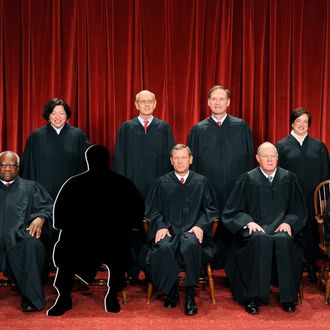
It’s one of those developments that drive non-lawyers justifiably crazy. A federal policy potentially affecting millions of undocumented immigrants and of interest to many millions more Americans is being left in limbo by a Supreme Court nondecision (with no explanation, either) over a procedural action by an obscure Texas judge.
That’s the practical effect of the 4–4 “decision” today in United States v. Texas. Technically, all that happened is the Court failed to overturn a 2–1 decision by the Fifth Circuit Court of Appeals affirming the decision of district-court judge Andrew Hanen to issue a preliminary injunction against enforcement of the Obama policy offering temporary relief from deportation to “DREAMers” and their parents. Hanen has not conducted his trial on the merits of the policy, though his injunction indicated his belief the policy was likely to run afoul of constitutional limitations on presidential power. There’s also a controversy over the legal “standing” of Texas and the 25 other states joining the challenge to Obama’s policies to bring the suit. A SCOTUS decision might have narrowly addressed procedural issues, or broadly interpreted the weighty constitutional questions involved. The oral arguments in April indicated a host of possibilities.
But we just don’t know what the Court nearly did, or might have done, or could do next time around; there apparently were not five votes for anything substantial. It is clear, in retrospect, that the deadlock would not have transpired if Justice Scalia were still alive, and won’t persist when he is finally replaced. The case could well come back to SCOTUS once Hanen has had his trial, assuming we don’t by that point have a President Trump who’s made the whole thing moot by killing the underlying initiative. Hillary Clinton is absolutely right in saying that the case “shows us all just how high the stakes are in this election.”






























